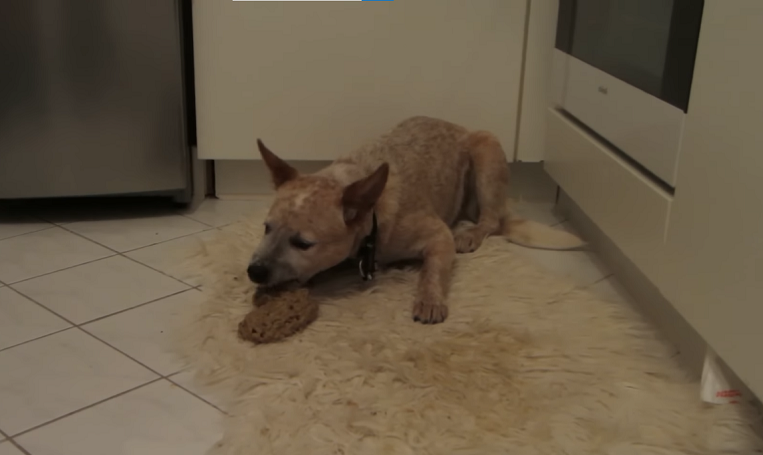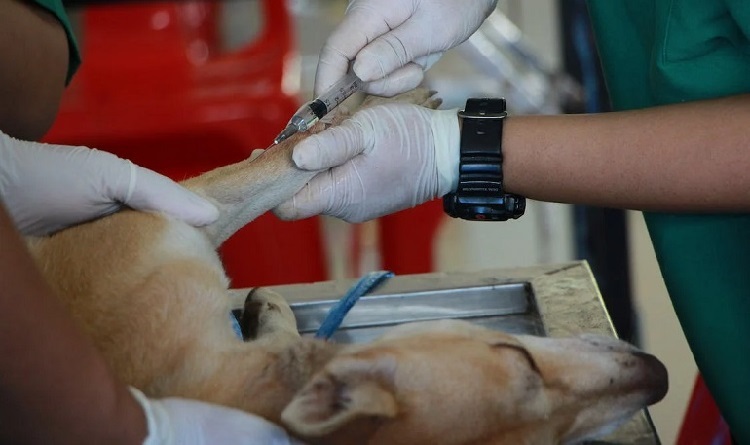It’s not uncommon for our furry friends to throw up every now and again. In fact, it is almost a given, especially if they are renowned counter surfers or trash can specialists.
And don’t rule out other animal feces. Dogs are renowned nibblers of poop. But sometimes, your dog vomiting can signify something more serious.
Should you rush them to the vet or adopt a wait-and-see attitude? And how do you determine if your vomiting dog requires urgent medical treatment?
In this article, we discover the possible reasons behind a dog’s vomiting, what vomiting treatments are available and when you should be seeking help from a vet.
What Is Vomiting?
Vomiting in dogs is when they forcefully throw up the contents of their stomach or upper small intestine.
You may be alerted that something is not right and that vomiting by your dog is imminent if it starts drooling, whines, paces, or you hear loud gurgling noises from its stomach.

How Do I Recognize Vomiting?
Distressing as it is to see your dog vomiting, how do you differentiate between regurgitation and chronic vomiting?
Regurgitation
Regurgitation is the passive motion of partially digested food and fluids sitting in the dog’s esophagus and is coughed up through its mouth seemingly effortlessly.
There is no forceful ejection of the stomach contents by your dog, and the cylindrical shape of regurgitated matter typically consists of undigested food, water, and saliva.
Generally, the odd episode of regurgitation may be that your dog ate more than it could handle and was active right after eating. And unlike vomiting, there is no warning that it’s about to occur for you or your dog.

Vomiting
On the other hand, dog vomiting is a much more forceful act that often involves your dog letting you know beforehand that something is amiss.
When your dog vomits, it usually involves its body becoming tense as the muscles contract, abdominal heaving, and retching sounds.
When vomited up, the dog’s stomach contents can be partially or fully digested food, or there could be bile from the small intestine.
When Is Dog Vomiting Normal?
Healthy dogs are natural purgers means a dog throws up to empty their stomach of unwanted food, material, or fur.
Dog vomiting is not uncommon and is best described as a built-in safety mechanism to remove something disagreeable and is not necessarily something to worry about.

Your dog may have snacked on too much grass or eaten too quickly, gotten sick, but had normal bowel movements and continued about their day as if nothing had happened. Vomiting can also be a serious symptom of accidental drug intake like marijuana in dogs.
But when should you be concerned?
- Your dog’s vomiting without a break more than once a day for more than 24 hours.
- Frequent vomiting with other symptoms, such as fever, diarrhea, and excessive drooling
- Your dogs vomit contains blood
- Continuously retching with nothing coming up
- You suspect your dog has ingested a toxic material
- Vomiting mucus without the presence of food
- Your dog vomits, and it’s accompanied by seizures
- Your pet is still a puppy
Types of Dog Vomit
As gross as it sounds, the color and consistency of your dog’s vomit can provide important clues about the possible cause of their vomiting.
Sometimes the cause of your dog’s vomiting will be obvious such as sticks or items from the garbage.
Look at the consistency. Is it chunky? This is typically a symptom of regurgitation of dog food that hasn’t been digested by your dog properly.
While foamy vomit tinged with yellow and slimy liquid vomit may be associated with bile problems. It could be harmless or indicate more severe health issues which need to be addressed.
If your dog is throwing up what looks like coffee grounds, this could indicate internal bleeding. As blood often resembles dark brown coffee grounds and is a cause for concern.
A dog’s vomit can also take on the color of the regurgitated food that was ingested if it contains dyes. However, bright green vomit suggests that your dog may have eaten mouse or rat poison.
However, if your dog makes repeated efforts to vomit and only produces small amounts of white foam and no actual vomit, immediate medical attention is advised, as this is one of the characteristic signs of a twisted or upset stomach.
What Causes Acute Vomiting in Dogs?
Acute or chronic vomiting in dogs is something you need to take seriously as a responsible pet parent. While dog vomiting may be due to a minor intestinal upset, it could also signify a more serious and life-threatening illness. Following may be some of the possible causes:

1. Ingestion of Irritating Substances
Dogs, by nature, are scavengers. If they are hungry, part of a dog’s behavior is to simply snoop around until they find something to satisfy that hunger. And nine times out of ten, they will find it in the garbage.
Eating moldy or spoiled food full of bacteria or other organisms results in an illness called a garbage gut.
The bacteria get into your dog’s gastrointestinal tract and produce toxins that are absorbed into the animal’s bloodstream. The results are similar to food poisoning in humans.
2. Toxins or Poisons
Now, we all know that our canine companions should never be fed human foodstuff, especially table scraps and chocolate, whether as a treat or otherwise.
But it’s not just chocolate that is dangerous for dogs. Any product containing caffeine, alcohol, grapes, raisins, onion, garlic, avocado, alcohol, nuts, and xylitol in chewing gum is on the list too.

3. Pancreatitis
Pancreatitis, an inflammation of the pancreas, is a serious condition in dogs that can be life-threatening if not diagnosed and treated early enough.
With this, your dog’s digestive enzymes slowly destroy the pancreatic tissue due to damage or blockage of the pancreas outflow ducts.
In 90% of cases, the cause of pancreatitis cannot be determined. However, factors that can contribute to its onset in your dog include high-fat meals, obesity, medications, toxins, and hereditary disorders, amongst others.
4. Kidney Failure
Kidney failure, also referred to as renal failure, can be classified into two types in dogs.
Acute renal failure is typically associated with the ingestion of toxins such as grapes and raisins or infections, which suddenly cause kidney function to decline in your dog.
While chronic renal failure, known as the silent killer, involves a more gradual loss of kidney function, which is often associated with a geriatric decline in a dog.
5. Liver Failure
Sadly, liver disease is the fifth most common leading cause of death for canines. And once this workhouse of an organ fails, it is only a matter of days before the onset of death.
Again toxins are an underlying cause of liver failure.

A dog’s liver can also become stressed by flea and tick pesticides, dewormers, food additives, processed foods, vaccines, and medications, among others.
Additionally, trauma to the liver due to heatstroke or an accident, cancer of the liver, cysts or gallstones, and viral and bacterial infections can also contribute to liver failure in a dog.
6. Diet Change
Some dogs, just like their human counterparts, suffer from sensitive stomachs that can become easily irritated if introduced to a change in diet.
Your dog’s microbiome and digestive enzymes will have adapted to the food they are fed. An abrupt brand change can cause an inflammatory response along the intestinal lining of the stomach.

7. Intestinal Parasites
Common parasites known as ascarids, such as roundworms, whipworms, hookworms, or tapeworms, are known to result in a vomiting dog.
Worms can be incredibly uncomfortable for your dog as they feed off the partly digested food in the dog’s intestines and blood.
Worms are passed onto your dog when they ingest contaminated soil or feces containing eggs or larvae that have been passed on from other infected animals.
Another parasite that causes discomfort to a canine is giardia, which is spread through contaminated water, food, or soil.
8. Viral Infection
Distemper is one of the most serious viral diseases your dog can pick up as it attacks their gastrointestinal, respiratory, and nervous system.
The virus is spread through airborne exposure from an infected dog or wild animal, with a mortality rate of 80% in puppies and 50% in adult dogs.
Parvovirus and canine coronavirus (not to be confused with the same virus that causes COVID-19 in humans) also infect the stomach and intestines, where it does the most damage.
Parvo is particularly prevalent in puppies aged six weeks to six months, who are more susceptible to the virus until they have received all their vaccinations against it.
9. Medication Reaction
Despite being given with the best of intentions, some medications can cause unwanted side effects in our canine companions.
As most of these medications are absorbed via the gut in dogs, it’s not unusual that upset stomachs, vomiting, and diarrhea are the side effects.
Some of the more common culprits are antibiotics, steroids, and non-steroidal anti-inflammatory medications.

10. Bloat
Gastric dilation and volvulus (GDV) is a life-threatening disorder requiring urgent surgery and a vet immediately.
Although commonly seen in deep-chested large dogs, bloat causes the gas-filled stomach to twist upon itself, so that contents of the stomach can’t be released, which puts stress on the heart and lungs, and your dog may have difficulty breathing.
Triggers associated with bloat include ingesting uncooked dough, eating rapidly, having a poor appetite, being thin or underweight, and even having an anxious temperament, amongst others.
11. Bacterial Infection
Bacterial infections, such as salmonella, E. coli, clostridium, and campylobacter, can all cause vomiting in your dog and, in some cases, blood poisoning.
These abnormally high amounts of bacteria in your dog’s small and large intestines can be acquired from eating contaminated food or water and coming into contact with infected animal feces.
12. Heat stroke
Also referred to as hyperthermia, heat stroke in your dog occurs when its body temperature exceeds 103°F due to exposure to excessive heat.
There are three main heat stroke types, the first being when the animal is exposed to an excessively hot or humid condition.
The second type is exertional heat stroke, which can occur due to excessive exercise.
And the third type is due to secondary issues such as uncontrolled tremors or seizures.
Why Is My Dog Throwing Up Frequently?
If your dog is throwing up frequently, it could signify something far more serious and point to an underlying medical condition.

Look out for the following symptoms that accompany the vomiting
- Abdominal pain
- Weakness
- Vomit with blood in it
- Depression
- Weight loss
- Severe dehydration
- Fever
What Types of Tests Are Performed to Find the Cause of Vomiting?

If your dog appears otherwise healthy and does not display other symptoms except vomiting, the cause may not be that serious.
A few basic tests will be conducted by veterinary staff to rule out certain infections and parasites first.
If, however, the vomiting is associated with other clinical signs, such as abdominal pain or other unusual symptoms, a more intensive series of tests, like complete blood work, will be conducted on your pet to look for more serious diseases.
Diagnostic tests may include:
- Blood tests, fecal tests, and urine tests
- Ultrasound
- X-rays
- A biopsy of the stomach and intestinal tract by endoscopic examination or
- Exploratory surgery
How Is Vomiting Treated?

The treatment plan for your dog’s vomiting will depend mainly on the diagnosis made by the vet after a physical examination to rule out any underlying serious diseases.
Stomach inflammation is the cause of most dog vomiting, and vets commonly advise to withhold food until the vomiting is controlled.
Additionally, you may be advised to feed your dog a bland diet of boiled chicken and fish to be given in small portions until the body’s healing mechanisms have corrected the problem.
In mild cases, anti-nausea medication may also be prescribed to promote normal movement in your dog’s intestinal tract and control vomiting.
For more severe cases, and in case of dehydration, veterinary staff may admit your pet for intravenous fluids to correct electrolyte imbalances and for observation.
If your dog’s condition does not improve within 48 hours of treatment, further tests or surgery may have to be conducted to identify the cause of why your dog is vomiting.
Conclusion
Your dog’s vomiting is either caused by poor canine judgment, or its symptoms may point to a more serious underlying health issue.
Erring on the side of caution by seeking appropriate medical attention, if necessary, from a veterinarian is always an excellent move to make.
After all, as responsible pet owners, it’s up to us to make the right judgment call for our faithful furry friends!












